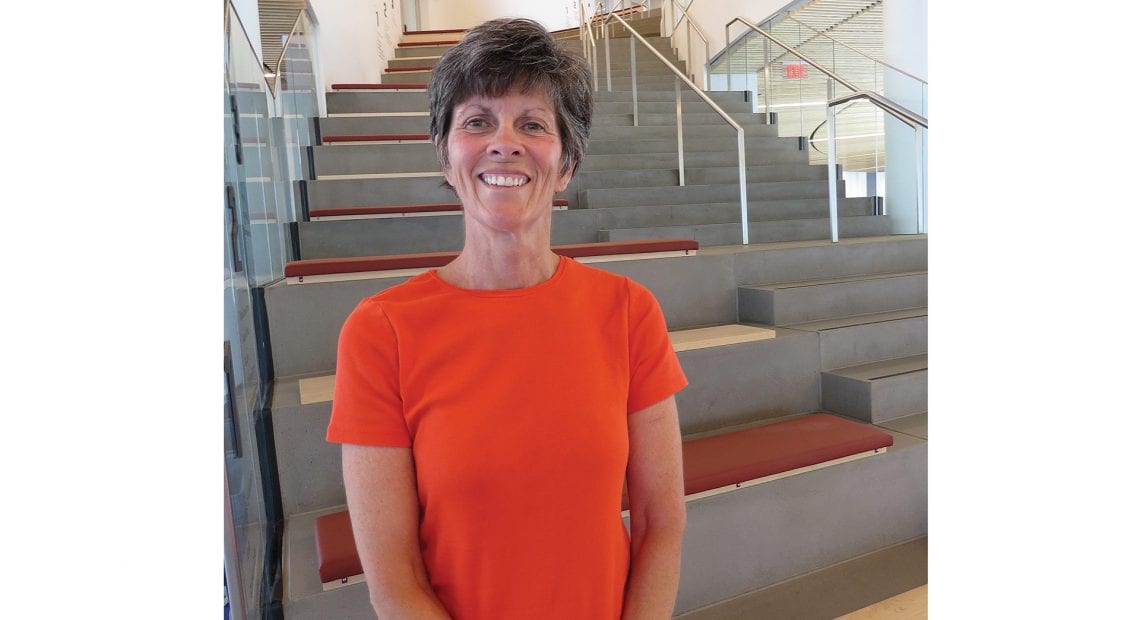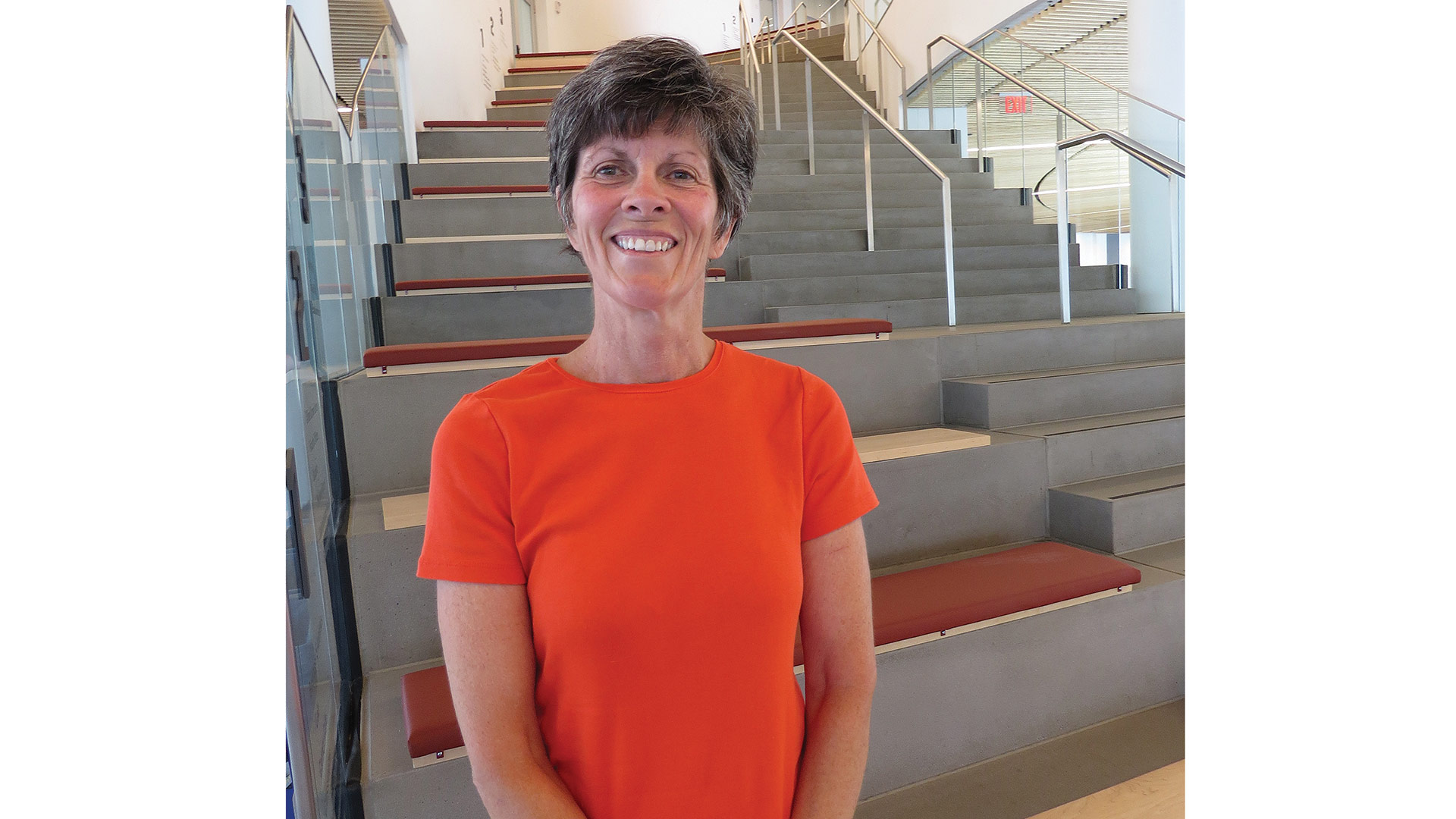
Isenberg Turns the Pandemic into a Learning Experience
Maintaining Momentum

Anne Massey says that early on, she told faculty and staff at Isenberg that the pandemic was not to be looked at as “a short-term problem we’re just trying to solve.” Instead, it has been a learning experience on many levels.
When Anne Massey arrived at the Isenberg School of Management at UMass Amherst in the late summer of 2019, she came with a lengthy set of plans, goals, and ambitions for an institution that was steadily moving up in the ranks of the nation’s business schools and determined to further enhance its reputation.
The overarching plan was to decide what was being done right, what could be done better, and how the school could continue and even accelerate its ascendency with those rankings.
Massey was already making considerable headway with such initiatives when COVID-19 arrived just eight months later and turned normalcy on its ear. But she was determined not to let the pandemic create a loss of focus or momentum.
And almost 16 months after students went home for a spring break from which they would not return, she can say with a great deal of confidence that she has succeeded with that broad mission.
In fact, the pandemic may in some ways have even created more momentum for Isenberg, which is now the top-ranked public business school in the Northeast.
Indeed, those at the school have used the past 15 months as a valuable learning experience, said Massey, who was most recently the chair of the Wisconsin School of Business. She stressed repeatedly that this was a time, as challenging as it was, not to simply get through or survive, and as a homework assignment for her staff, she strongly recommended Ryan Holiday’s book The Obstacle Is the Way — The Timeless Art of Turning Trials Into Triumph.
“I said early on that we’re not going to be looking at this pandemic, and all the things that it wrought for us in terms of remote teaching, remote learning, and remote work, as a short-term problem that we’re just trying to solve,” she explained. “I said that we’re going to learn things, and we’re going to carry them over to when we came back and be better than we were in March of 2020.”
She believes the school will be better because of how it has learned to use technology to do things differently and in some ways better than before, but also because of the many experiences working together as a team to address challenges and find solutions.
“I said early on that we’re not going to be looking at this pandemic, and all the things that it wrought for us in terms of remote teaching, remote learning, and remote work, as a short-term problem that we’re just trying to solve. I said that we’re going to learn things, and we’re going to carry them over to when we came back and be better than we were in March of 2020.”
Moving forward, Massey said those at Isenberg, whether they’ve read Holiday’s book or not, are responding well to the notion of looking at obstacles as opportunities and not letting challenges, even global pandemics, stand in the way of achieving goals and improving continuously.
As she noted, this mindset will serve the institution well in the future as it and all of its many competitors prepare to return to normal, but not a world exactly like the one that existed 16 months ago.
“It was also obvious to me in March and April of 2020 that everyone was going to be forced to be remote, at least for some period of time,” she said. “We’d been in the online space for 20 years, so we were ahead of the game. But now, suddenly, everyone was going to be playing the game. They weren’t all going to be good at it; some of them still aren’t good at it, but think they are.
“But now, there are going to be more people joining this competitive space,” she went on. “And some of them have more resources than we do. So we needed to say, ‘we’re just going to keep plowing forward. We need to be better than they were because that’s the only way we’re going to maintain our competitive position.”
For this issue and its focus on education, BusinessWest talked at length with Massey about her challenging and, in many ways, intriguing first two years at the helm at Isenberg, and especially about how the school will take the experiences from the pandemic and use them to make the school, as she said, better than it was before anyone heard of COVID-19.
Getting Down to Business
The lawn signs were first introduced a year or so ago.
They say ‘Destination Isenberg,’ and were intended to be placed on the front lawns of the homes of students bound for the school — enrollment in which is increasingly becoming a point of pride.
While those first signs to be issued were technically accurate, many of the students didn’t have the Amherst campus as their actual destination because of COVID, said Massey, adding that that the latest signs — they’re at the printer now and will be distributed soon — speak the full truth: students will be back in the fall.
There will be a party in August to welcome them to campus, and planning continues for an orientation that will feature programs and events not only for freshmen but also the sophomores who couldn’t enjoy such an experience last fall because of the pandemic. As part of those celebrations, there will be recognition of the national-champion UMass hockey team, which included 15 players who are enrolled at Isenberg.
The students will be coming back to the ultra-modern, $62 million Isenberg Innovation Hub, which opened in January 2019 and sat mostly quiet for the bulk of the pandemic. They’ll be coming back to a school now ranked 53rd in the country by U.S. News & World Report when it comes to undergraduate programs (34th among public schools).

The ‘Destination Isenberg’ signs soon to grace lawns across the country will have real meaning this year, with the school back to fully in-person learning this fall.
They’ll be returning to a school where enrollment continues to grow even as competition increases and high-school graduating classes shrink. “We have the largest incoming class ever,” Massey said. “We have more than we probably should have, but we’ll deal with it.”
But they won’t be returning to the same school. Indeed, as she noted, they’ll be coming back to, or joining, an Isenberg that used the pandemic as a learning laboratory of sorts, one that will stand the school in good stead as it continues its quest for continuous improvement and movement up the rankings in an even more competitive environment.
She said this work actually started before the pandemic, soon after she arrived on the campus. She started with a survey that went out to faculty and staff that included three key questions:
• ‘What unexploited opportunities do you see for Isenberg?’
• ‘What’s standing in our way of those opportunities?’ and
• ‘Given what you know, what do you think Anne Masse should focus on for the next year?’
She received a 95% response rate to that survey, and the answers provided considerable fodder for discussion at what would eventually be more than 30 meetings with various groups within the school, including faculty and staff.
She then developed five key priorities for maintaining and enhancing the school’s reputation for excellence and went “on the road,” as she put it, visiting alumni in Boston, New York, San Francisco, and other cities. These visits continued until the pandemic arrived, she said, adding that, while the road trips have to come to a halt, the work of developing these priorities, identifying areas in which the school needs to invest, and shaping all this into a strategic plan have continued unabated.
Getting back to the pandemic, Massey actually had considerable experience on her résumé in the realm of research regarding virtual teams and how they function. And that work came in handy during the pandemic, especially as it related to communication, coordination, and relationships among individuals in those teams.
“We have the tools and technology that support communication and that support collaboration and coordination of our work,” she explained. “But the relationship building and maintaining relationships is something that people often don’t pay attention to. They get wrapped up in the work, and not the nature of the team and the relationships amongst the team members.”
Flashing back to March 2020, when students, faculty, and staff were sent home for spring break, Massey said she knew they wouldn’t be coming back anytime soon and that all operations, from teaching to recruiting to development, would have to go remote.
“I knew that we had the tools, but what we really needed to focus on were the connections,” she told BusinessWest, adding that she soon launched what became knowns as the Dean’s Briefing, which, as that name suggests, was a briefing sent out to faculty and staff almost weekly.
“Sometimes it was a pat on the back, sometimes it was ‘I know how hard it is,’ sometimes it was personal, sometimes it was about what was going on at the university and what we thought the summer was going to look like and what the fall would look like; it was always about trying to keep people in the loop,” she said, adding that she encouraged the associate deans, the department, and others to do the same with their own group. “They needed to maintain communication that was positive and supportive.”
Driving Forces
At the same time, Massey emphasized the importance of the faculty engaging with students and helping them through a difficult and unprecedented time.
Because not all faculty members had taught online, or certainly to that extent, the school named five Isenberg teaching fellows, all of them experts in remote learning, who are assigned to one or a few departments and a cohort of faculty.
“They took the ball and ran with it,” Massey said, adding quickly that she wasn’t sure at first how this initiative would go over. “They had workshops, they had brown-bag lunches, they used Zoom, they coached people, they surfaced new best practices, they shared ideas … they even wrote a few research papers that have been published. They were phenomenal.”
Lessons learned from the pandemic and these teaching fellows will carry over into ‘normal’ times, she said, adding that she’s expecting to get back on the road in the fall and continue to push the five priorities for the school as it works to sustain and enhance its overall reputation for excellence, a key driver of those all-important rankings.
“They’re all about reputation in various ways,” Massey said of the rankings, of which there are many across several categories, from undergraduate offerings to part-time MBA programs. “The question that I asked over a year ago, and that I always ask, is ‘how might we sustain or advance our reputation for excellence in all we do? And excellence in terms of students and our quality of students, the quality of our faculty and their research, the placement of our students, what the recruiters think, and companies once students are working for them and they’re out a few years. Do they deliver the goods? All of that.”
Listing those priorities, which all intersect, she started with attracting exceptional students, which means more than those with the top GPAs. It also means achieving diversity and attracting students with a commitment to their communities, she said, adding that another priority is sustaining faculty excellence, especially at a time when business schools, and higher education in general, is facing what Massey described as a “looming retirement problem.”
“It’s becoming more and more difficult to attract and retain faculty; we’re not producing Ph.D.s at the rate that we probably need to,” she explained. “So I’m always thinking about how we can make this a good place for prospective faculty, and then, when we get them, how do we keep them? And how do we support them in their research efforts, and how do we support them becoming better teachers?”
Another priority is what Massey called “enabling career success,” which involves both current students and alumni, many of whom were impacted by the pandemic and the toll it took on employers in many sectors. To address this matter, she created an Office of Career Success and integrated the Chase Career Center with the school’s Business and Professional Communications faculty in an effort to expand services to alumni as well as current students.
Still other priorities include “creating global citizens and inclusive leaders” and “inspiring innovation in teaching and learning,” Massey said, adding that she wants Isenberg to be a significant player in business education, especially when it comes to advances in teaching and the use of emerging technology.
“How do we use 3D? What about augmented reality?” she asked, adding that these are just some of the questions she and others at the school are addressing. “One of our initiatives when it comes to inspiring innovation in teaching and learning is the creation of a ‘technology sandbox,’ a dedicated space where new and emerging technologies will be available for our faculty to play with and our staff to play with — because you can’t provide support for something if you don’t know how to use it — and for our students to play with.”
Positive Signs
Getting back to those lawn signs, Massey, who has one in her yard (her son attends the school), said they’re great exposure for Isenberg, especially outside of Massachusetts, where the name is somewhat less-known, but becoming better-known.
“It’s good to have them all over the country, and the students love them,” she said, adding that these are literal signs of growth and progress at Isenberg, but there are many others, from the record class for the fall of 2020 to its longstanding home at to the top of the rankings of public business schools in the Northeast — it’s been there since 2015.
There were signs of progress during the pandemic as well, she said, even if they’re harder to see. The school was determined not to lose momentum during that challenging time and to turn that obstacle into an opportunity.
Time will tell just how successful that mission was, but Massey already considers it a triumph for all those at the school.
George O’Brien can be reached at [email protected]




